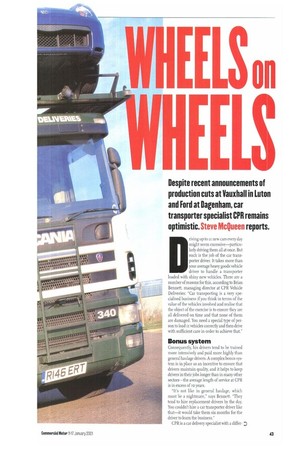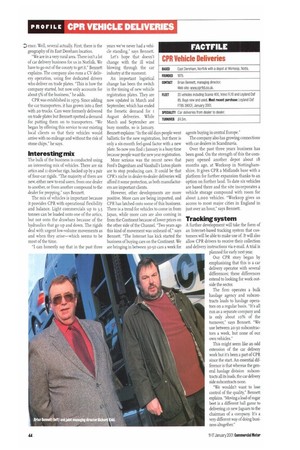EELSOA EELS
Page 45

Page 46

If you've noticed an error in this article please click here to report it so we can fix it.
Despite recent announcements of production cuts at Vauxhall in Luton and Ford at Dagenham, car transporter specialist CPR remains optimistic. Steve McQueen reports,.
riving up Loll new cars every day might seem excessive—particu
larly driving them ail at once. But
such is the job of the car trans porter driver. It takes more than your average heavy goods vehicle driver to handle a transporter loaded with shiny new vehicles. There are a number of reasons for this, according to Brian Bennett, managing director at CPR Vehicle Deliveries: "Car transporting is a very specialised business if you think in terms of the value of the vehicles involved and realise that the object of the exercise is to ensure they are all delivered on time and that none of them are damaged. You need a special type of person to load II vehicles correctly and then drive with sufficient care in order to achieve that."
Bonus system
Consequently, his drivers tend to be trained more intensively and paid more highly than general haulage drivers. A complex bonus system is in place as an incentive to ensure that drivers maintain quality, and it helps to keep drivers in their jobs longer than in many other
sectors the average length of service at CPR is in excess of to years.
"It's not like in general haulage, which must be a nightmare," says Bennett. "They tend to hire replacement drivers by the day. You couldn't hire a car transporter driver like that—it would take them six months for the driver to learn the business."
CPR is a car delivery specialist with a differse' D ence. Well, several actually. First, there is the geography of its East Dereham location.
"We are in a very rural area. There isn't a lot of car delivery business for us in Norfolk. We have to go out of the county to get it," Bennett explains. The company also runs a CV delivery operation, using five dedicated drivers who deliver on trade plates. "This is how the company started, but now only accounts for about 5% of the business," be adds.
CPR was established in 1979. Since adding the car transporters, it has grown into a fleet with 20 trucks. Cars were formerly delivered on trade plates but Bennett spotted a demand for putting them on to transporters. "We began by offering this service to our existing local clients so that their vehicles would arrive with no mileage and without the risk of stone chips," he says.
Interesting mix
The bulk of the business is conducted using an interesting mix of vehicles. There are six artics and ir drawbar rigs, backed up by a pair of four-car rigids. "The majority of them are new, either new to end users, from one dealer to another, or from another compound to the dealer for prepping," says Bennett.
The mix of vehicles is important because it provides CPR with operational flexibility and balance, Light commercials up to 3.5 tonnes can be loaded onto one of the artics, but not onto the drawbars because of the hydraulics that go up and down. The rigids deal with urgent low-volume movements as and when they arise—which seems to be most of the time.
"I can honestly say that in the past three years we've never had a vehicle standing," says Bennett.
Let's hope that doesn't change with the ill wind blowing through the car industry at the moment.
1111NOYEI £4.5m.
An important logistical change has been the switch in the timing of new vehicle registration plates. They are now updated in March and September, which has ended the frenetic demand for I August deliveries. While March and September are busy months, so is January. Bennett explains: "In the old days people went ballistic for the new registration, but there is only a six-month feel-good factor with a new plate. So now you find i January is a busy time because people want the new year registration.
More serious was the recent news that Ford's Dagenham and Vauxhall's Luton plants are to stop producing cars. It could be that CPR's niche in dealer-to-dealer deliveries will afford it some protection, as both manufacturers are important clients.
However, other developments are more positive. More cars are being imported, and CPR has latched onto some of this business. There is a trend for vehicles to come in from Japan, while more cars are also coming in from the Continent because of lower prices on the other side of the Channel. "Two years ago this kind of movement was unheard of," says Bennett. "The Internet has kick started the business of buying cars on the Continent. We are bringing in between 30-50 cars a week for agents buying in central Europe."
The company also has growing connections with car dealers in Scandinavia.
Over the past three years business has been good. On the strength of this the company opened another depot about 18 months ago, at Worksop in Nottinghamshire. It gives CPR a Midlands base with a platform for further expansion thanks to an option on further land. To date six vehicles are based there and the site incorporates a vehicle storage compound with room for about 2,000 vehicles. "Worksop gives us access to most major cities in England in just over an hour," says Bennett.
Tracking system
A further development will take the form of an Internet-based tracking system that customers will be able to make use of It will also allow CPR drivers to receive their collection and delivery instructions via e-mail. A trial is planned for early next year.
Our CPR story began by emphasising that this is a car delivery operator with several differences; these differences extend to looking for work outside the sector.
The firm operates a bulk haulage agency and subcontracts loads to haulage operators on a regular basis. "It's all run as a separate company and is only about io% of the turnover," says Bennett. "We use between 20-30 subcontractors a week, but none of our own vehicles."
This might seem like an odd extension of the car delivery work but it's been a part of CPR since the start. An essential difference is that whereas the general haulage division subcontracts all its loads, the car delivery side subcontracts none.
"We wouldn't want to lose control of the quality," Bennett explains, "Moving a load of sugar beet is a different ball game to delivering io new Jaguars to the chairman of a company. It's a very different way of doing business altogether."
































































































